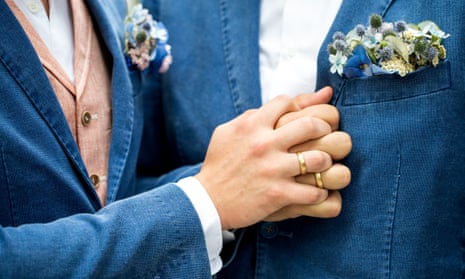The rights of same-sex spouses must be recognised by every member of the EU, even if a country’s government has not authorised gay marriage, the European court of justice has been advised.
In what has been hailed as a major step forward for equal rights, Melchior Wathelet, a Belgian advocate general in the Luxembourg court, said gay spouses had standing in countries even where governments were implacably opposed to same-sex marriage.
Opinions given by ECJ advocate generals are non-binding on the court’s judges but are normally followed by the full court. A final decision will be delivered in the coming months.
Wathelet’s opinion was given in the case of a Romanian national, Adrian Coman, who wanted to be able to build a life in Romania with his American husband, Claibourn Robert Hamilton, with whom he had been living for four years in the US before marrying in Brussels in 2010.
Q&AWhat is the European court of justice (ECJ)?
Show
The Luxembourg-based court of justice of the European Union is the highest court in Europe. Panels of judges from member states sit to interpret whether EU law is being fairly applied and can issue binding rulings over national courts. It is composed of one judge per member state, although it normally hears cases in panels of three, five or 15 judges. The 28 judges are assisted by assisted by 11 Advocates-General.
The ECJ has had a relatively benign history with the UK – unlike the more contentious European court of human rights in Strasbourg – but nonetheless has become a symbol of compromised sovereignty during the Brexit referendum. The EU has insisted that any transition period during Brexit must continue to be policed by the ECJ.
Romania prohibits marriage between people of the same sex. It is one of six EU member states, along with Poland, Slovakia, Bulgaria, Lithuania and Latvia, that offer no legal recognition for same-sex relationships.
The Romanian authorities refused to grant a right of residence on the grounds that Hamilton could not be classified in Romania as the spouse of an EU citizen. The men appealed to Romania’s constitutional court, which referred it to Luxembourg.
Giving his opinion, Wathelet said governments may not impede the freedom of residence of an EU citizen by refusing to grant his or her spouse, who is a national of a non-EU country, a right of permanent residence in their territory. He explained that EU law was neutral on the gender of a spouse.
A directive on the EU’s freedom of movement principle in 2004 grants rights to an EU citizen’s spouse, without specifying how spouse is defined.
The ECJ’s judgment when it comes could have wider repercussions for the range of benefits and rights that may be claimed by those in same-sex marriages by ensuring that the term spouse is gender neutral in law.
Wathelet told the court that the EU gave spouses of EU nationals the right to live and work in the bloc. It only defined spouse with reference to a relationship based on marriage and was neutral both as to the sex of the persons concerned and the place where that marriage was contracted.
It was his opinion that “in view of the general evolution of the societies of the member states of the EU in the last decade in the area of authorisation of same-sex marriage” it was no longer appropriate to follow the case law definition of marriage as “a union between two persons of the opposite sex”.
The Dutch MEP Sophie in ‘t Veld said: “This is fantastic news and a landmark opinion for rainbow families. Freedom of movement is a right of all EU citizens; it cannot be restricted because of whom they love. The European Union protects our rights.”










